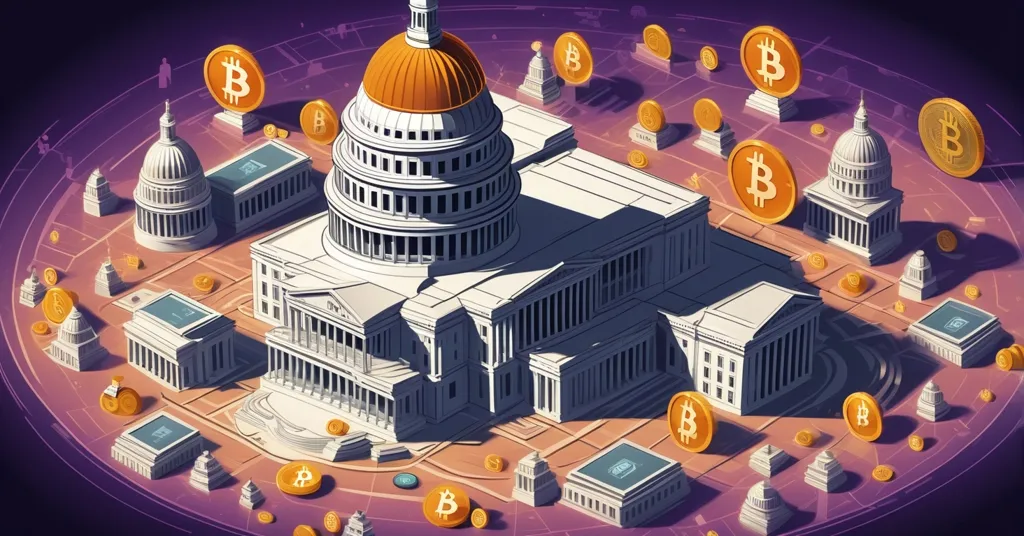Arizona’s Strategic Bitcoin Reserve Bills Advance Amidst Governor’s Veto Threat

Arizona Leads the Charge in Establishing a Strategic Bitcoin Reserve
Arizona is at the forefront of a national trend, pushing forward with two bills, SB 1373 and SB 1025, aimed at establishing a Strategic Bitcoin Reserve (SBR). These legislative efforts highlight the growing interest in Bitcoin as a potential store of value and investment asset among U.S. states.
- AZ’s SBR bills pass House Rules Committee
- Headed for full House vote
- Governor Hobbs’ veto looms large
- Other states like OK, TX, and UT also in the race
On March 24, 2024, the Arizona House Rules Committee approved both SB 1373 and SB 1025, deeming them “constitutional and in proper form.” This approval marks a significant step forward, as the bills are now set to be considered in a full floor vote in the Arizona House of Representatives. However, the path to becoming law remains challenging.
SB 1373 proposes the creation of a strategic digital assets reserve, which would be funded by seized digital assets. Under this bill, the state treasurer would manage these assets, with the authority to invest up to 10% of the fund’s value annually. This approach is broad, encompassing not only Bitcoin but also other digital assets such as stablecoins, which are cryptocurrencies designed to minimize price volatility, and non-fungible tokens (NFTs), which are unique digital assets. It’s as if Arizona is not just testing the waters but jumping into the deep end of the crypto pool.
On the other hand, SB 1025 takes a more targeted approach, allowing the Arizona Treasury and state retirement system to invest up to 10% of their available funds directly in Bitcoin. This bill also includes provisions for secure storage, ensuring that Arizona’s Bitcoin investments are protected. It’s a bold move, betting on Bitcoin’s potential to continue its upward trajectory.
Yet, a significant hurdle remains: Governor Katie Hobbs. With a veto rate of about 22% in 2024, the highest in the nation, Hobbs poses a potential threat to these bills. As Bitcoin Laws (@Bitcoin_Laws) noted, “Gov. Katie Hobbs has a notorious reputation for vetoing Republican legislation.” If she decides to veto these SBR bills, it could derail Arizona’s crypto ambitions.
“Arizona’s House Rules Committee passed both SBR bills (SB1373 and SB1025), ruling them ‘constitutional and in proper form.’ The bills have now passed their assigned committees, meaning they should be headed for a full floor vote.” – Bitcoin Laws (@Bitcoin_Laws)
While Arizona leads the charge, other states are not far behind in the race to establish their own Bitcoin reserves. Oklahoma’s HB 1203 passed the House with a strong 77-15 vote, positioning it alongside Texas’ SB 21, which passed the Senate with a 25-5 vote. Utah, however, faced a setback when it removed references to a strategic reserve at the last moment. It’s a legislative race where each state is vying for a position in the crypto spotlight.
“Big Oklahoma update: Bitcoin Reserve Bill HB1203 passes the House, 77-15. OK’s bill now moves into equal second place in the State Reserve Race with Texas’ SB21. Arizona remains in the lead.” – Bitcoin Laws (@Bitcoin_Laws)
As these states push forward with their SBR initiatives, Bitcoin’s status as a legitimate asset class is gaining traction. At the time of this writing, Bitcoin was trading at $86,452, underscoring its potential for significant returns. However, the crypto market’s volatility remains a critical risk factor that states must navigate carefully.
The establishment of state-level Bitcoin reserves could herald a new era of institutional acceptance for cryptocurrencies. It’s a move that could drive further adoption and mainstreaming of Bitcoin, but it’s not without its challenges. From security concerns to political hurdles, the road ahead is fraught with obstacles. Yet, if Arizona and its fellow states can successfully navigate these challenges, they could be at the forefront of a financial revolution.
While the optimism surrounding Bitcoin’s potential is palpable, it’s crucial to remain grounded in reality. The cryptocurrency’s volatility and the regulatory uncertainties it faces are significant risks that cannot be ignored. States venturing into Bitcoin investments must do so with a clear understanding of these challenges, balancing the potential rewards with the inherent risks.
Moreover, the broader implications of state-level Bitcoin reserves extend beyond financial returns. They signal a shift towards recognizing cryptocurrencies as a legitimate part of the financial ecosystem, potentially paving the way for more widespread adoption and acceptance. However, this shift also raises questions about the role of government in managing digital assets and the potential for centralization within a decentralized system.
As we watch Arizona and other states navigate this new frontier, it’s clear that the journey towards integrating Bitcoin into state financial strategies is just beginning. The outcome of these legislative efforts could set a precedent for how other states and even nations approach the integration of cryptocurrencies into their financial systems.
Key Questions and Takeaways
- What is the current status of Arizona’s Strategic Bitcoin Reserve bills?
- What are the key differences between SB 1373 and SB 1025?
SB 1373 focuses on establishing a digital assets reserve funded by seized assets, while SB 1025 allows the state to invest directly in Bitcoin.
- What challenges do the SBR bills face in Arizona?
The primary challenge is the potential veto by Governor Katie Hobbs, who has a high veto rate.
- Which other states are advancing similar SBR legislation?
Oklahoma, Texas, and Utah are also advancing legislation to establish Bitcoin reserves, though Utah’s legislation was modified to remove references to a strategic reserve.
- What is the current market price of Bitcoin?
At the time of this writing, Bitcoin was trading at $86,452.



